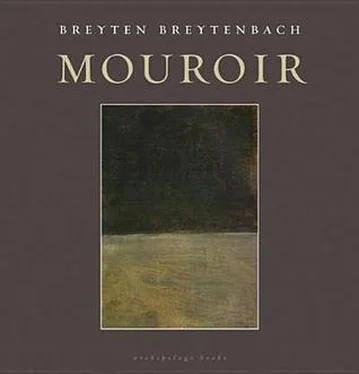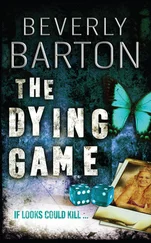Like seeing it grows darker and less clear. Too dark to read the wounds in the newspaper. In this way one comes down into the desert. The maggots in the meat are lighter in colour. They are blind and minute. Wingless pale fat flies. A foetus. Immobility. Behind the walls he perceives women giggling. Among the crumbled remains of the long-gone outpost he comes across some carvings. These are the leftovers, dark, hybrid, one would expect to find in a burial place. They flake to the touch. They are faceless, defaced. Defeated perhaps? Blind as defecation. He notices that in the cold the cars are plundered. The annealed vehicles still sport aerials, the feelers of an arachnid, useless as armes blanches in a battle lost and buried in a dream. He decides to no longer attend the religious meetings. He has seen the grey horse with the wind a cold flame in its mane.
Also the meetings are no longer conducted in the big house up by the square. The laughing old man with the mirrored boots has retired to his caravan. There in conclusion the private ceremony will be enacted. Yet one senses the metamorphosis and the heterosis. In this way it will be done. Like news. Wires. A kite of dust. Word goes through the corrupted pattern of the once-existent town: the old man pronounces the word behind the sagging partitions of his greyish caravan. “We never had a horse” — this he says — “so go and fetch the man called Nefesj. The one who is said to be the foreigner.”
He’d expected death to be a newsflash of coded images, or maybe the sudden opening and unfolding of core impressions absorbed over the space of a lifetime, the hobo’s wealth of rags and tatters, but with the awakening he heard just a rhythmic thumping: like a heart without circumference. At first it reminded him of a ship, of the enormous pistons driving the propellers. And when he propped himself up, stiff in body and insipid of thought, then it was indeed so, for he found that he was in a smallish cabin. But the throbbing proceeded from the cabin (or ring) just next to his. There, lifting himself up on his toes, he observed sailors tamping down the earthen floor tightly with pneumatic rammers. Lounging against the walls, officers or nurses in white overcoats oversaw the labour and when they noticed his presence they smiled ever so slightly their thin purplish smiles. Their teeth weren’t as white as the cloth of their protective garments. Perhaps it was their intention to be friendly or to manifest sympathy.
Where had he been in the dark interlude? Did he sleep? For such an eternity? Was he absent merely, elsewhere, so occupied by other matters that this time-stretch must perforce seem black to him, this in-between? Or could it be a crumbling instance of amnesia? After all, everyone is sickening for black-out. Maybe he himself was ill, bruised by this cataclysm which had overtaken his family. Family yes, but he couldn’t be sure that it concerned his family only — didn’t it hit all of mankind? Or, fear above all fears, the simplest explanation was probably that he, Lamourt Lasarus, is dead; that the imperceptible gurgling of time, just like the structures of cause and effect and the vibrating of life into death, can no longer hold any sense or relevance for him. . The cabin is empty. Over the tamped-down soil messages and squiggled calculations can now be finger-traced, carpets may be spread, furniture placed. The sleeping space may once again serve as the temporary living quarters of time-fattened voyagers. There and back the boat may sail tacking about with the breezes, or in one straight line without ever again entering a port or dropping the hook in the mouth of a delta, protected by cove or inlet, and with time their bodies will be eaten, fermenting, skeletons, dust — and thus find a permanent abode. Will be shaken as life-matter is rocked in the egg.
And more he remembers. Before this dark time they were surely somewhere on the shallow land. A great mishap occurred in that place. His father with the round-shaped grey head had died there already. They scooped up the leftovers and put it on board when they departed and this relic is somewhere in the hold packed in ice. With hands folded over the chest and with a grey expression where the face used to be, the body lies somewhere behind partitions among ice blocks like the wreck of a winter ship aground on mountains of white glass. Will they bury him also in one of the cabins? No — when they came aboard his mother and his sister were still alive. It was during the obliterating voyage they died and that is precisely why they had to be laid away in situ . Nothing must upset the pre-arranged projects.
He also is reminded that the inmates of that shallow land with the few slopes then looked at him half in pity and partly with distaste. He was never very popular with them. Something he must have done to provoke the disapproval. Would it be that the catastrophe which plunged them all into obscurity could be ascribed to him or his actions and positions? Was he to be held responsible for the Great Flood and the never-come-again? There is no ending to the wretchedness. His younger brother’s darling cat, the house cat, Cat Ashcoat, was also killed during the same events. From this blow his brother went soft in the head. Or maybe he too was affected by the mysterious happening and the pollution. The cat was never very big, with long orange-coloured fur. Later, much later — he would remember — when already aboard this ship, his little brother still sat cradling the small carcass in his lap all the while humming softly. He wore his pyjamas. There was an inconvenient smell. And in this intense and autistic isolation his brother sat pulling fistfuls of fur from the cat’s corpse. It came away easily. Over the white material of his outfit the orange pelt glittered.
And now he tried all along the corridor to reach the upper deck. He considered it strange to move so slowly, so uncertainly, so deadened , and that it must perhaps be ascribed to the vessel’s kicking and sliding and mating movements, but he never felt seasick. On either side of the long passage all the dark cabins. At times he could hear slow noises through the partitions. He was looking for light now, an illumination of the dark time sequence behind him during which, so it would appear, everything took place and form, also the transformations; he wants to situate himself again; he, Fagotin Fremdkörper, needed a clarification of his own condition, a focal point, an I, a departure. In the dining saloon, by a long table together with some other passengers clad in formal evening garb, he comes upon his two elder brothers upright in their chairs. They are wearing black tuxedos with black bow ties knotted at the throat. His eldest brother’s face is all caved in, is as grey as a dried-up waterfall, but still the face tries to look at him in an ironic way. There is neither victuals nor cutlery nor crockery nor crumbs nor custard stains on the white table linen. His second brother’s face is very grey and stiff and scarred and callous with undigested wounds. The face is too dry to be nodded in his direction. There is neither food nor silver implements nor rice grains nor the blotches of faulty pouring on the white table linen. Opposite them at the table the women are seated, bent slightly forward over the napkins on the flat surface so that the enclosed white breasts may be seen darkly, lollipop tits, rancid maybe, a shimmering of lacquer over the exposed skin. The inlaid eyes of the ladies are dark and their mouths a little ajar and these orifices are deep and pulsating and warm red from within, just like glasses filled with wine. Just like bowls full of blood. These females did not turn their heads, neither did they lift their hands. There is only the swelling and the folding of the mating broody breasts. And the extended and luxurious dining space filled with a golden glow from the mirrors lining the walls is similarly rising and falling rhythmically. But he dares not sit down with the others, he is not correctly dressed, his heart is fluttering too painfully in his throat, and judging by the way they are looking or not looking at him it is evident that his presence is unwelcome. He was absent already. People are raising crooked smiles to him. People have mouths full of toothlike reflections.
Читать дальше












